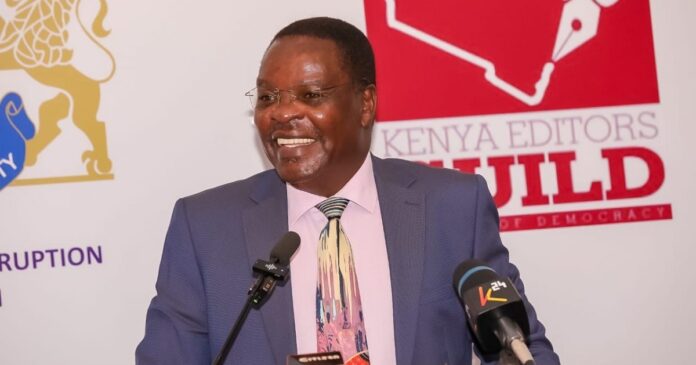|
Getting your Trinity Audio player ready...
|
By Henry Owino
Nairobi, Kenya: In a significant event to mark the progressive and persistent fight against corruption, the Ethics and Anti-Corruption Commission (EACC), Kenya Editors Guild (KEG), and the Media Council of Kenya (MCK) have joined forces to reinforce the battle against the malpractice.
The EACC partnership with the media fraternity is seen as a key milestone aimed at fighting against graft in Kenya. The collaboration is intended at enhancing media coverage and reporting graft of public economic crimes to help reshape Kenya’s world perception on corruption.
The initiative was officially made between the EACC and Kenya Editors Guild (KEG) during a media consultative meeting held in Nairobi.
The discussions mainly revolved around strengthening transparency, safeguarding recovered assets, serving the public good and enforcing law against graft regardless of one’s social status. This way, the EACC is set to improve Kenya’s ranking on the international corruption perception index and restore public trust in the institution.
The citizens of Kenya have also been called upon to report, whistle-blow, and be vigilant on governance and accountability wherever they are to help curb corruption.
The event, held under the theme: “Turning the Tide: From Stolen Assets to Public Good,” focused on asset recovery and the reinvestment of recovered assets for the benefit of the public.
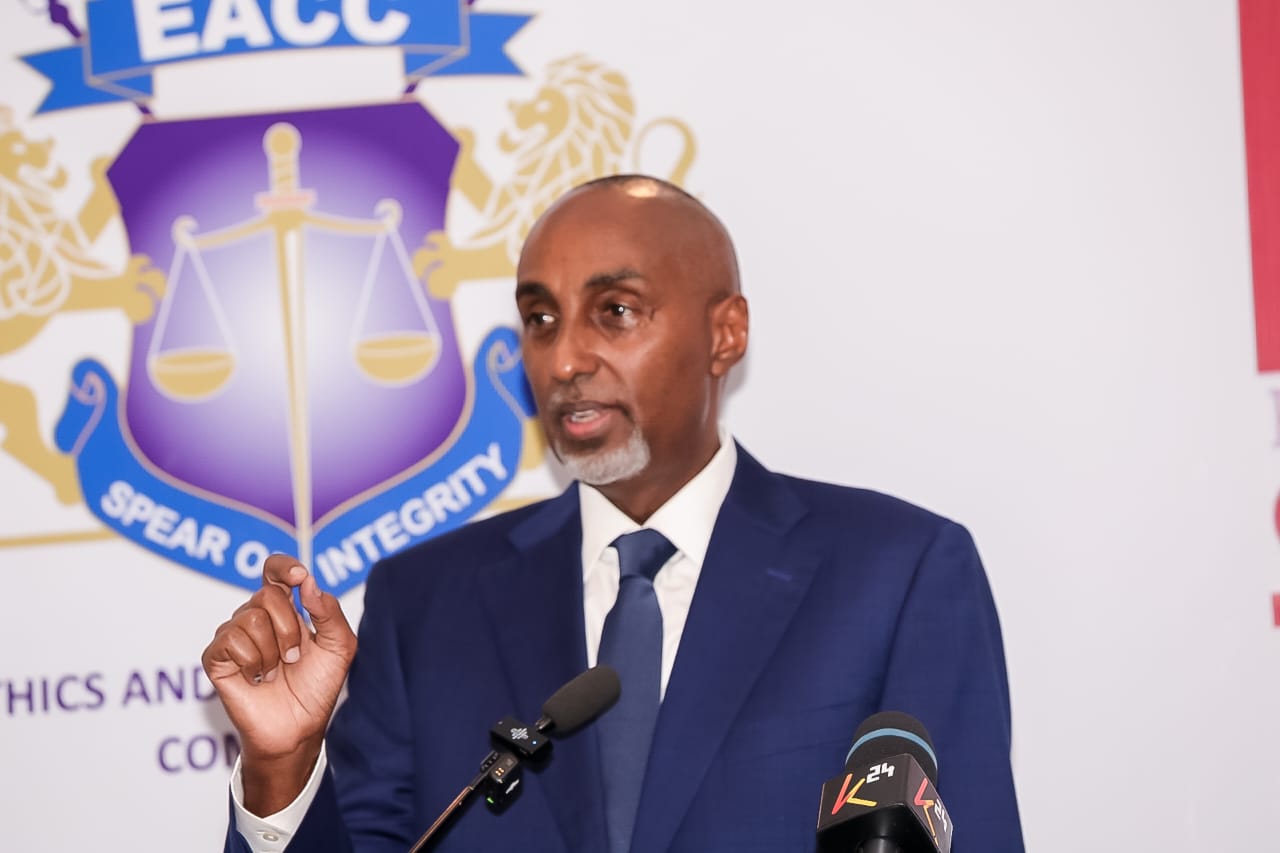
Abdi Mohamud, Chief Executive Officer, EACC stressed that the fight against corruption cannot be won by the Anti-Corruption watchdog alone. He urged the media to remain proactive in exposing corruption with fear or favor.
“I invite the media to work closely with us. Together, we can ensure that corruption does not rob our nation of a bright future,” Mohamud said.
Mohamud also announced plans for structured engagements, training, and capacity-building programs to strengthen cooperation between the EACC and journalists. Mohamud emphasized the media’s critical role in shaping public discourse and holding leaders accountable.
“Media plays a pivotal role in society by exposing wrongdoing and ensuring accountability. In the fight against corruption, the media acts as both a powerful ally and a vigilant watchdog,” he emphasized.
The Current Status
The EACC Boss revealed that in the past five years, the commission has recovered Ksh 28 billion in corruptly acquired assets, which have since been restored for public use.
“The rationale behind asset recovery is to ensure that the corrupt do not profit from their illegal conducts. This not only restores stolen wealth to the public but also serves as a deterrent,” EACC Boss explained.
He revealed that in September 2024, the EACC handed over land worth Ksh 5 billion and cash assets of Ksh514 million to public institutions.
The Anti-graft watchdog CEO further noted that over 400 cases are currently at various trial stages, targeting the forfeiture of Ksh50 billion in corruptly acquired assets.
Mohamud outlined the commission’s priority areas in tackling corruption, including asset tracing and forfeiture, monitoring capital-intensive projects and enhancing integrity testing.
“We are determined and intensifying our efforts to trace and recover unexplained assets and ensure they are returned to the public,” he assured.
“We also aim to identify corruption loopholes in major projects, track budget utilization, and intervene in cases of fund misappropriation,” Mohamud added.
He disclosed that EACC is enhancing integrity testing, strengthening compliance with leadership and integrity laws, training and capacity building and leveraging technology.
“Technology is a powerful enabler in the fight against corruption. We will integrate artificial intelligence (AI), automation, and data analytics to strengthen our investigative capacity,” the CEO said.
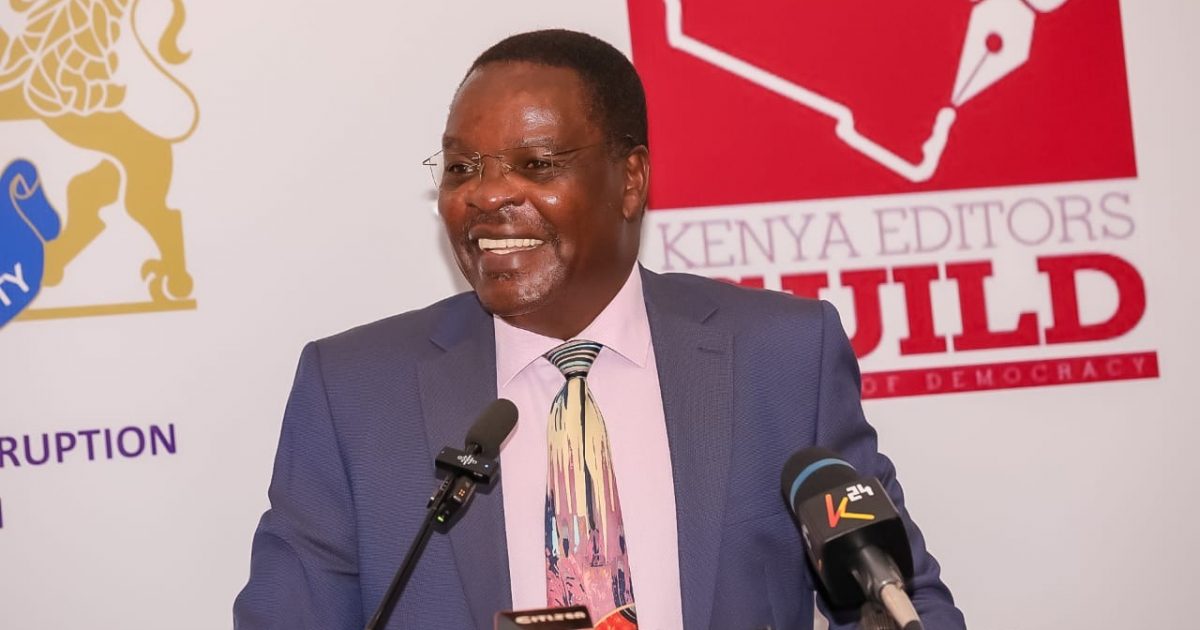
On the other hand, Bishop Dr. David Oginde, EACC Chairman said as EACC, the responsibility involves monitoring, investigating, preventing, prosecuting, and recovering stolen assets or assets yet to be stolen from thieving hands.
Dr. Oginde therefore emphasized that EACC will work according to its mandates and within law to even go beyond asset tracking and recovery to actively utilizing recovered resources for national benefits.
He said none of the corrupt arrested have ever confessed guilty. They always give excuses of being targeted for opposing the government, or ‘small fish’, or silencing them for positions held.
“Let us deal with the monkeys that are eating from the labour of our farms. If we work together, we will win this fight,” Dr Oginde affirmed.
He said EACC is doing everything possible to stop corruption and create public awareness of the institution. Therefore, through the pivotal role the mainstream media plays, it will enhance reshaping the public perception and trust in the organization.
“When Kenyans are not aware of our actions, it means their perception on the fight against corruption is skewed,” Dr. Oginde observed.
“The Global ranking by Transparency International in its Corruption Perception Index put Kenya at number 121 out of 180 with a score of 32 percent in 2024. This is a massive improvement from the previous position of 126 in 2023, yet we still lag behind the global average of 50 percent,” EACC Chairman, pointed out.
The Chairman regretted that poor corruption ranking on global platforms not only damages the country’s reputation but also deter investors, developments thereby compounding economic challenges. It leads to high costs of running businesses, living standards, rising rates of unemployment and deterioration of essential public services.
He disclosed these are some of the reasons for inviting mainstream media on board as partners, through structured mechanisms including a formal Memorandum of Understanding (MoU) to seal agreement.
Media Fraternity Take
Zubeidah Koome, President Editors Guild said media are ready and willing to work with the anti-graft watchdog because both entities play almost similar roles for the public good. She anticipated the partnership will yield some fruits through proper coordinated approach owing to the high scale of financial misconduct in the country.
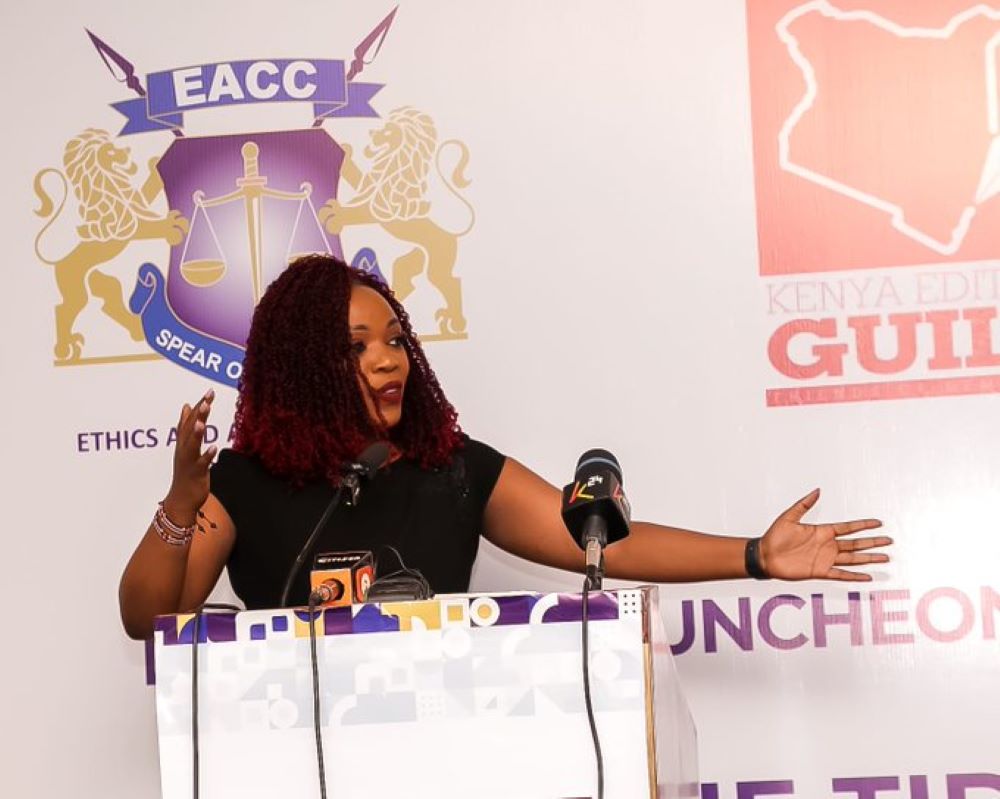
Ms. Koome pointed out critical roles journalists play in exposing grafts amid challenges faced in their work. For instance, limited access to crucial data, legal threats, physical attacks, confiscation of media equipment, blocking journalists from coverage among others.
KEG President therefore called upon EACC to support media houses and journalists dedicated to investigative journalism by allocating apportion of recovered assets to fund media outlets. She explained the funds would counter revenue shortfalls and provide more training opportunities for journalists specializing in investigative and corruption coverage.
“We request EACC to step in and support the media fraternity through training of journalists on covering crimes, corruption cases among other investigative stories that need funding from recovered assets. It will support and strengthen especially investigative desks in newsrooms,” Ms Koome requested.
David Omwoyo, CEO, Media Council of Kenya (MCK) acknowledged the importance of this collaboration and expressed his optimism towards the cause, stating that he was hopeful that it would bear fruit.
Omwoyo emphasized the need for media funding to help various journalists in pursuit of stories on corruption cases. Additionally, he called for partnerships from more stakeholders, like the UN Office on Crime, who he said could easily chip in on an already rolling project.
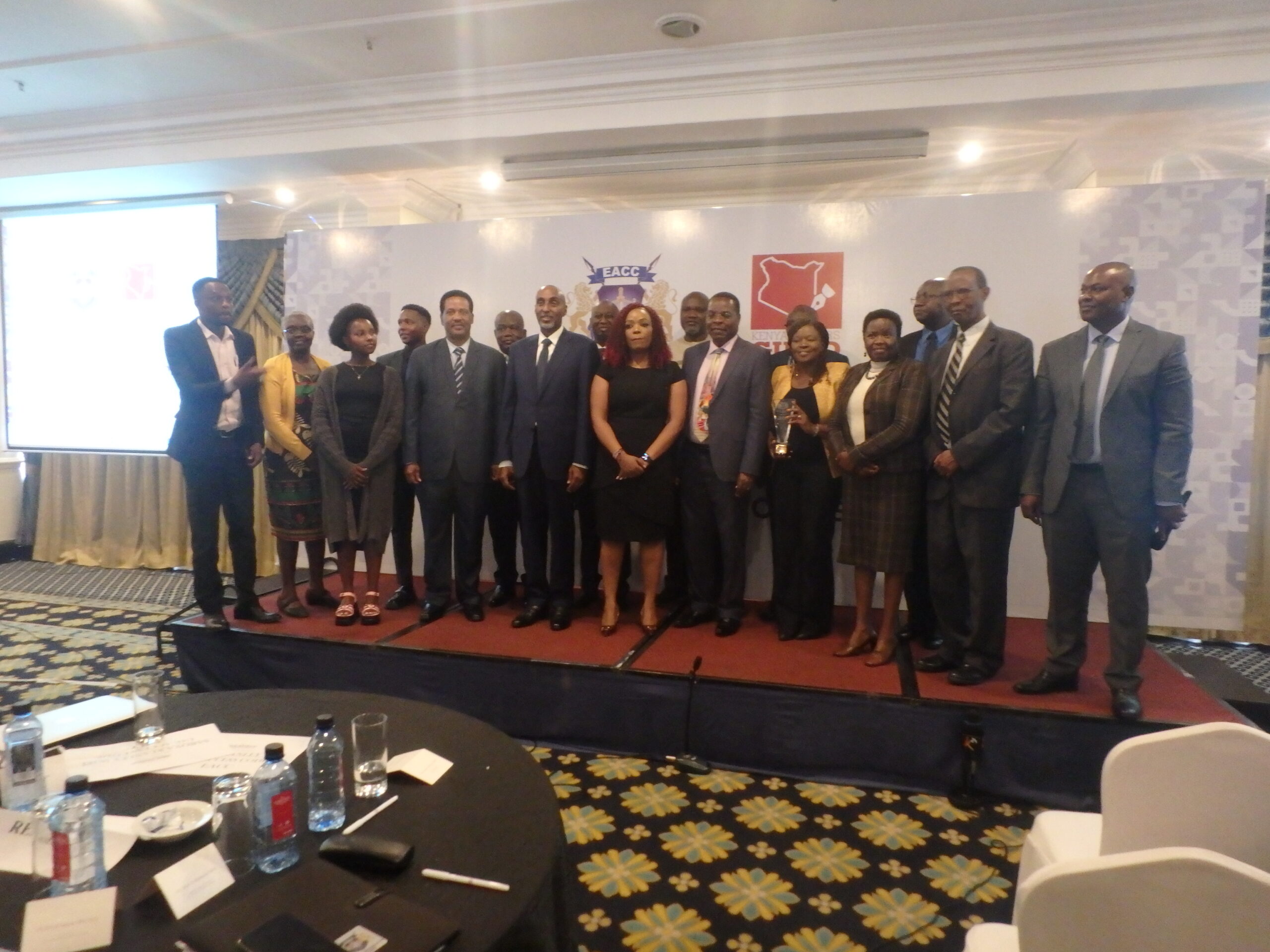
Joe Ageyo, Editor -in-Chief Nation Media Group emphasized the need for training of investigative journalists especially in the wake of misinformation and disinformation campaigns aimed at discrediting journalists.
Ageyo cautioned against the misuse of artificial intelligence (AI) to fabricate large scale fake news that is becoming a big threat to media credibility.
“The use of AI to generate perfectly fake information very easily and on a large scale is a direct threat to the credibility of the media. When exposing the corrupt, they tend to fight back and use everything in their power to tarnish the reputation of journalists, which are some of the challenges we are struggling with,” Ageyo laments.
He therefore urged the EACC to consider setting some percentage of recovered assets to protect journalists from already mentioned challenges, threats, financial vulnerabilities among others.
“Independent media is a watchdog in exposing corruption, yet we are currently facing financial struggles, threats of political and commercial influence. Establishing a Media Sustainability Fund financed by stolen recovered assets will go a long way in enhancing media sustainability,” he stressed.
Churchill Otieno, President, Africa Editors Forum, reinforced the argument, stating that financial instability poses a direct threat to investigative journalism. He explained without adequate funding; media houses struggle to maintain the rigorous scrutiny needed to hold the powerful accountable.
“We cannot sustain public accountability without sustaining public good journalism. If we have proper funding, we can have journalism that is well resourced and tells the truth no matter who is being highlighted for graft,” Otieno said.

